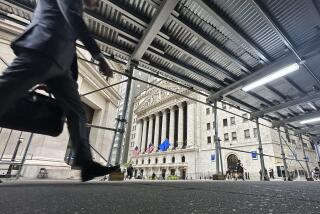Economic Jitters Sink Stocks; Dow Slips 1.66
NEW YORK — The stock market recorded its third straight loss Tuesday, faced with fresh evidence of slowing economic growth.
The Dow Jones average of 30 industrials dropped 1.66 to 1,258.06, bringing its decline since last Thursday’s close to 26.72 points. The average had been down more than 8 points at its lowest levels of the day.
Volume on the New York Stock Exchange stepped up to 111.81 million shares from 88.86 million Monday.
Analysts said traders were unsettled by new signs that the economy was losing momentum.
The Commerce Department reported Tuesday morning that the index of leading economic indicators dropped 0.2% in March. It also revised downward the gains previously posted for the index in January and February.
Surprised by Report
The news came as a surprise to many Wall Street analysts, who had been projecting at least a modest increase.
The same agency also reported that new factory orders fell 0.9% in March.
The evidence of economic weakness pushed interest rates a bit lower in the bond market. But brokers said stock traders were concerned that rates might go up again when the government makes its quarterly offering of notes and bonds, the details of which were announced after the close.
Despite all the worries facing investors, analysts noted that the market staged a mild recovery in the afternoon after the Dow industrial average dipped to near 1,250--the lower end of the trading range in which it has fluctuated for the past several weeks.
R. J. Reynolds Industries fell 5 to 77 and Philip Morris was down 5 1/8 at 85 7/8. A Wall Street Journal article Monday discussed product-liability suits being filed against tobacco companies.
Trans World Airlines climbed 1 1/8 to 15 3/8. There were rumors on Wall Street that financier Carl C. Icahn was buying the stock heavily.
City Investing, down 3/8 at 37 5/8, was the volume leader on the strength of a 3.13-million-share block that traded at 37 1/2 in the over-the-counter market.
Arco Climbs gain
Atlantic Richfield was second on the active list, up 7/8 at 59 1/8 on top of a 5-point gain Monday, when the company announced a restructuring and stock repurchase plan and also raised its dividend.
In the daily tally on the Big Board, about nine issues declined in price for every five that gained ground.
Large blocks of 10,000 or more shares traded on the NYSE totaled 2,299, compared to 1,709 on Monday.
Bond Rally Cools
Bond prices rose after the government report on the index of leading economic indicators. But prices later fell from the day’s highs in the wake of the Treasury’s announcement that it planned to sell $20.5 billion in notes and bonds at its quarterly refunding.
The federal funds rate, or interest on short-term loans between banks, traded at 8.75%, up from 8.50% on Monday.
Yields on 30-year Treasury bonds slipped to 11.48% from 11.52% on Monday.
In the secondary market, yields on three-month Treasury bills fell 3 basis points from Monday’s late levels to 7.86%. Six-month bills fell 2 basis points to 8.11%, and one-year bills were off 5 basis points at 8.32%. A basis point is one-hundredth of a percentage point.
In the secondary market for Treasury bonds, prices of short-term governments rose 1/8 point, intermediate maturities rose point and long-term issues rose 1/2 point, according to the investment firm of Salomon Bros. The movement of a point is equivalent to a change of $10 in the price of a bond with a $1,000 face value.
In corporate trading, industrials were up point and utilities were up 1/2 point in light trading.
More to Read
Inside the business of entertainment
The Wide Shot brings you news, analysis and insights on everything from streaming wars to production — and what it all means for the future.
You may occasionally receive promotional content from the Los Angeles Times.










